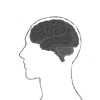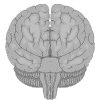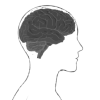Mental Health
Neuroscience and Mental Health research is the exploration of neural (brain) and cognitive (neural substrates of mental processes) mechanisms, as well as the neural mechanisms of emotion (stress responses, impulses and moods). Research in this arena includes behavioural neuroscience, affective neuroscience, cognitive neuroscience, cognitive psychology, psychopharmacology, functional neuroimaging, and genetics.
Mental health disorders are typically characterised by underlying psychiatric symptoms, presenting as clinically significant disturbance in an individual’s neural, cognitive (thinking processes), and emotional regulation, behaviour and motivation.
Generalised Anxiety Disorder (GAD) and Major Depressive Disorder (MDD) are the most prevalent mental health disorders globally. Moreover, the underlying neural, cognitive and emotional mechanisms are the least understood.
However, this is changing thanks to Neuroscience and Mental Health research! Read on for a snapshot of how neuroscience research is being translated into practical applications in healthcare, to ultimately change lives.
Blood Tests for Depression and Bipolar Disorder
(Neuro-molecular Biology, Psychiatry and Genetics)
A study at the Stark Neuroscience Institute – Indiana School of Medicine, researching the biological basis of mood disorders, conceived blood tests for psychiatric disorders such as depression and bipolar disorder. Blood tests can augment the traditional observational and diagnostic approaches that rely on modelling symptomology. By providing objective biomarkers, i.e., medical markers of blood (as well as other tissue, genetic, physiologic or radiographic evidence), this can help to clinically predict severity level and severity progression of diseases and status checks on treatment. More recent studies at Stark have identified blood gene expression biomarkers, subsequently ratified by genetic studies, that track memory/Alzheimer’s diseases and even suicidality (self-harm including suicide attempts). This is a major breakthrough in disease prediction, prevention and to support treatment of psychiatric conditions that sadly have a high global disease burden in morbidity and mortality.
Precision medicine for mood disorder
Re-purposing Drugs for Stress-Induced Psychiatric Conditions
(Neurochemistry, Psychopharmacology & Behavioural Neuroscience)
Researchers in this study led by the Department of Neuroscience – Icahn School of Medicine at Mount Sinai in the US, were able to see the larger implications for stress-induced psychiatric conditions, by adapting a drug intended for a different purpose. Their research tested the notion of Ketamine, used as an anaesthetic drug in surgical practice, being repurposed as a prophylactic (preventative) in postpartum depression. They have gathered preliminary evidence in humans and anticipate repurposing Ketamine for novel clinical applications in other stress-induced conditions, such as generalised anxiety disorder (GAD) and post-traumatic stress disorder (PTSD). We can now imagine the potential of a readily accessible treatment, that can buffer the deleterious effects of stress in war zones or suffered by frontline workers, such as in the NHS and emergency services.
Could a drug prevent depression and PTSD?
Ketamine as a prophylactic resilience-enhancing agent
Taking Folic Acid (Vitamin B9) is Associated with Decreased Risk of Suicidal Events
(Public Health Sciences)
The University of Chicago Public Health Sciences are hopeful about new findings that show folic acid (vitamin B9) treatment taken over a two-year period is associated with decreased risk of suicidal events (self-harm and suicide attempts) by as much as 44%. Existing treatments, such as medications like antidepressants, antipsychotics, and psychotherapy are inaccessible due to stretched resources and can have deleterious side effects; they do not work for everyone. Folic acid on the other hand is available without prescription, is fairly inexpensive, and has no prescribed side-effects under controlled usage. There also appears to be a dose-response of continued lowered risk of suicide attempt the longer folic acid is taken. Given the burden of suicide is a leading cause of mortality in the U.S. and the biggest killer of men under age 45 in the U.K., this simple prevention strategy could help save many lives.
Folic Acid Treatment is Associated with Decreased Risk of Suicide Events
What are some tips for mental health and the self?
Caffeine and Sleep (11:45)
Stress, Inflammation & Insulin Resistance (1hr:10)
A circadian plan for mental health (5mins.59)
The brain-changing benefits of physical exercise (12mins:54)
Optimise your exercise program with science based tools (2hrs:40)
Tips for improving health and wellbeing (12mins:54 per TED)
You can check out the transcripts and skip to areas of interest




